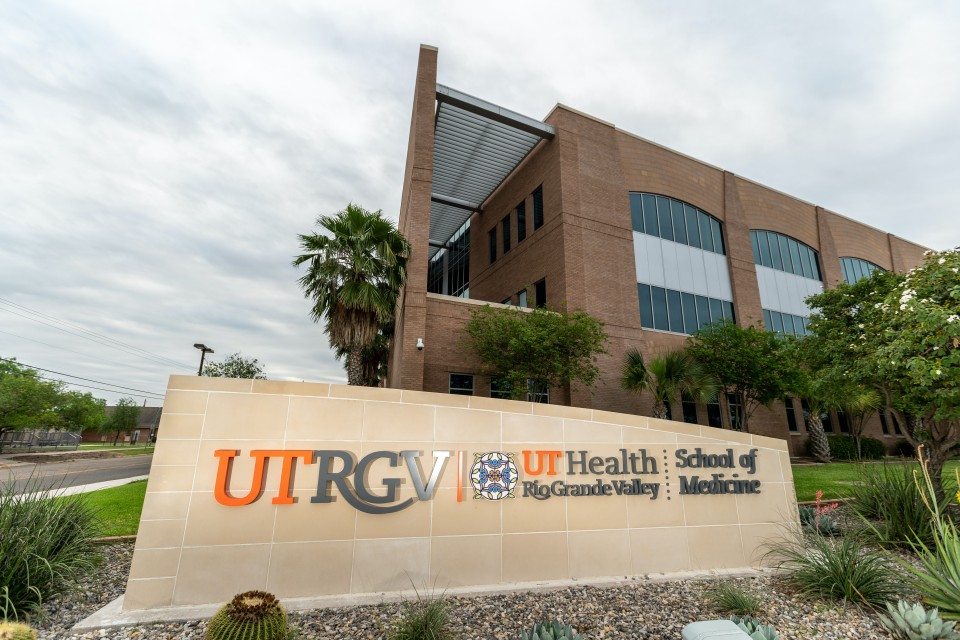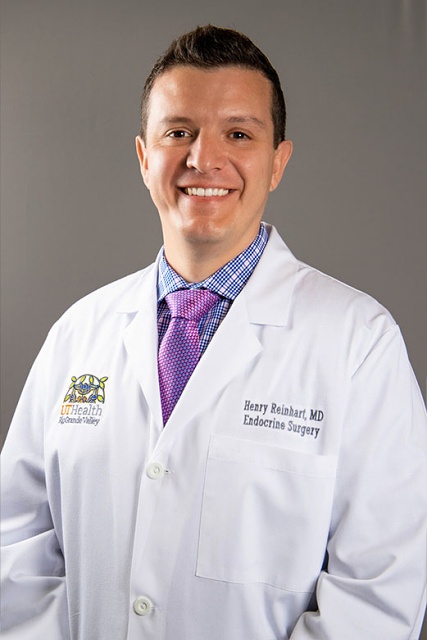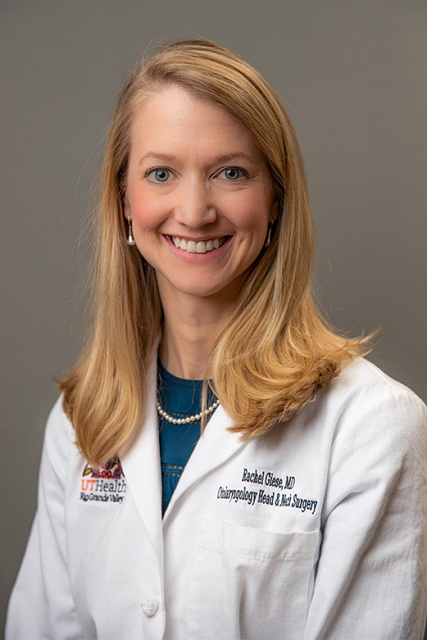
(UTRGV Photo by David Pike)
News Release | Health

(UTRGV Photo by David Pike)
Thursday, January 27, 2022
Community
By Karen Villarreal
RIO GRANDE VALLEY, TEXAS – Research and data show that early detection of conditions caused by the thyroid gland can be imperative, as those conditions can worsen slowly over time.
January is National Thyroid Month, and doctors at UT Health RGV have been encouraging the Rio Grande Valley population – where rates of thyroid disease are high – to be vigilant and not put off diagnosis and treatment.
Area doctors say that, for the Rio Grande Valley and Texas as a whole, the number of thyroid-related cancers is cause for concern.
DETECTION & TREATMENT

UT Health RGV’s Dr. Henry Reinhart – the only board-certified, fellowship-trained endocrine surgeon in the area – also is the only physician in the Mid- and Lower-Valley areas now treating certain thyroid conditions with radio frequency ablation, a new and leading edge treatment modality.
Reinhart, MD, FACS, said he sees, on average, 40 patients a month at UT Health RGV for thyroid problems.
“The thyroid is a small, butterfly-shaped gland in the neck, and it regulates the production of hormones that are involved with body temperature, digestion and other body processes,” he said. “People may not realize the severity of the issue. Left untreated, thyroid disease can be devastating to the heart and other organs.”
When the thyroid gland is producing too much or too little hormone, the patient has hypo- or hyper-thyroid issues, which sometimes can be managed with medication.
The first line of detection of thyroid problems is a TSH test, which may be followed by a neck ultrasound.
Large nodules can also be present around the thyroid gland – both cancerous and benign – which can make it hard to swallow or breathe and can cause voice changes.
“If they do have a thyroid nodule, they may need a biopsy to identify if it’s cancerous,” Reinhart said.
Some patients require additional treatment, surgery, or simply want the nodules reduced for cosmetic reasons.
THE LEADING EDGE
Radio frequency ablation (RFA) is the fastest way to shrink large nodules without more invasive surgery, Reinhart said.
“Patients who don’t want – or can’t have – surgery may experience relief from their symptoms via RFA treatment,” he said.
During RFA, a needle is inserted, and radio waves generate heat to shrink the nodule, allowing the tissue around it to be carefully preserved.
Overall, thyroid surgery can be technically challenging, Reinhart said, but very rewarding.
“It takes a special set of hands,” he said. “I like that I can help people have a long, full life.”
ULTRASOUND

In addition to Reinhart, UT Health RGV’s Dr. Rachel Giese, MD, specializes in diagnosing patients with thyroid issues using medical tools like ultrasound.
Giese, an otolaryngologist (ENT) and head and neck cancer surgeon, said ultrasound of the thyroid gland helps them identify and biopsy nodules.
“Many patients have thyroid nodules and never realize it. In most cases that is fine because most thyroid nodules are not cancerous,” she said.
“As a specialist, I like having a thyroid ultrasound in office because I can examine the patient myself. And ultrasound images help us show patients their own nodules,” she said. “Pictures make things clearer than an explanation alone.”ABOUT UTRGV
The University of Texas Rio Grande Valley (UTRGV) was created by the Texas Legislature in 2013 as the first major public university of the 21st century in Texas. This transformative initiative provided the opportunity to expand educational opportunities in the Rio Grande Valley, including a new School of Medicine and a School of Podiatry, and made it possible for residents of the region to benefit from the Permanent University Fund – a public endowment contributing support to the University of Texas System and other institutions.
UTRGV has campuses and off-campus research and teaching sites throughout the Rio Grande Valley including Brownsville (formerly The University of Texas at Brownsville campus), Edinburg (formerly The University of Texas-Pan American campus), Harlingen, Weslaco, McAllen, Port Isabel, Rio Grande City and South Padre Island. UTRGV, a comprehensive academic institution, enrolled its first class in the fall of 2015; the School of Medicine welcomed its first class in the summer of 2016, and the School of Podiatric Medicine in the fall of 2022.